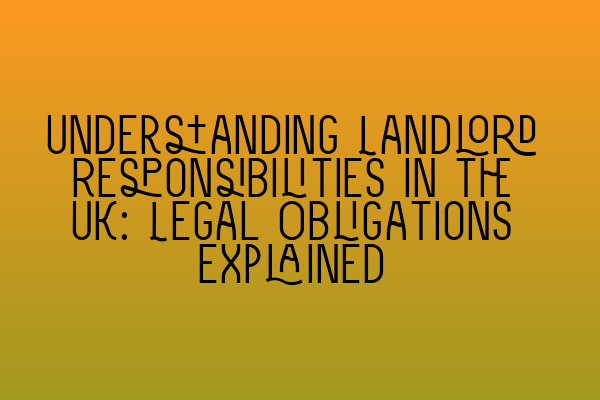Understanding Landlord Responsibilities in the UK: Legal Obligations Explained
As a landlord in the UK, it is crucial to understand and fulfill your legal responsibilities. Failing to do so can lead to legal disputes, financial penalties, and damage to your reputation. To help you navigate the complex world of landlord responsibilities, this article will provide a comprehensive overview of the legal obligations you need to be aware of.
1. Providing a Safe and Habitable Property
First and foremost, landlords have a duty to provide a safe and habitable property for their tenants. This includes ensuring that the property meets all health and safety standards, such as having a valid Gas Safety Certificate and regular electrical safety inspections. Additionally, landlords must provide adequate heating, proper ventilation, and functional facilities (e.g., water supply, sanitation).
2. Conducting Repairs and Maintenance
Landlords are responsible for ensuring that the property is maintained in good condition and carrying out necessary repairs promptly. This involves addressing issues such as plumbing problems, electrical faults, and structural defects. Moreover, it is essential to conduct regular inspections to identify any maintenance needs and take appropriate action.
3. Protecting Tenancy Deposits
If you take a deposit from your tenants, you must protect it in a government-approved tenancy deposit scheme. This ensures that tenants can recover their deposit at the end of the tenancy, provided they have met the terms of the rental agreement. Failure to protect the deposit or provide the required information to tenants within the specified timeframe can lead to legal consequences.
4. Complying with Tenancy Deposit Regulations
In addition to protecting the deposit, landlords must also comply with other tenancy deposit regulations. This includes providing tenants with prescribed information about the deposit scheme, details of how the deposit will be returned, and the circumstances under which deductions may be made. It is crucial to follow these requirements to avoid disputes and potential financial penalties.
5. Obeying Discrimination Laws
Landlords are prohibited from discriminating against potential or existing tenants based on certain protected characteristics, such as race, gender, disability, or religion. It is essential to adhere to these discrimination laws and ensure that all prospective tenants are treated fairly and equally throughout the tenancy application process.
6. Meeting Fire Safety Standards
Landlords must comply with fire safety regulations to protect their tenants and the property from fire hazards. This involves conducting regular fire risk assessments, installing smoke alarms on each floor, providing fire extinguishers and fire blankets (where necessary), and ensuring that escape routes are safe and accessible. Ignoring fire safety requirements can put lives at risk and lead to severe legal consequences.
7. Managing Tenancy Agreements
A properly drafted tenancy agreement is crucial for both landlords and tenants. It sets out the rights and responsibilities of each party and helps prevent disputes. It is essential to ensure that tenancy agreements comply with relevant legislation, provide clear information about the tenancy terms, and include necessary clauses to protect both parties’ interests.
8. Dealing with Evictions Fairly and Legally
While eviction is the last resort for landlords, there are instances where it may be necessary. However, it is essential to follow the legal eviction process outlined in the Housing Act 1988 and serve the appropriate notice to the tenant. Failing to follow the correct procedures can render an eviction illegal and result in legal repercussions.
Conclusion
Understanding and fulfilling landlord responsibilities is essential for maintaining a successful rental business in the UK. By providing a safe and habitable property, conducting necessary repairs and maintenance, protecting tenancy deposits, complying with discrimination and fire safety laws, managing tenancy agreements effectively, and dealing with evictions fairly and legally, you can ensure a positive renting experience for both you and your tenants.
If you would like further information about related legal topics, we recommend reading the following articles:
– Misrepresentation in Contracts: Unveiling Deceptive Practices
– A Closer Look at SQE Contract Law Syllabus
– SQE Contract Law: Analyzing Landmark Cases and Influential Judicial Decisions
– Understanding Contractual Capacity: Rights and Limitations
– Interactive SQE Mock Tests for Contract Law: Test Your Knowledge
At SQE Property Law & Land Law, we are committed to helping landlords navigate the intricacies of property law. Our expert solicitors can provide tailored advice and assistance to ensure you are fully compliant with your legal obligations. For more information, please visit our website or contact us directly.
